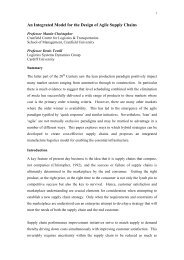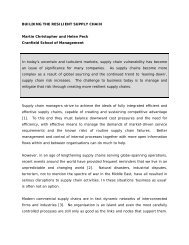Create successful ePaper yourself
Turn your PDF publications into a flip-book with our unique Google optimized e-Paper software.
42<br />
Insurance<br />
Timeliness of filing a claim<br />
The rule of prescription is like the<br />
sword of Damocles hanging over the<br />
head of every lawyer. In any dispute,<br />
one of the first things that lawyers must<br />
do when handling claims or disputes is<br />
to check whether there is still time to<br />
pursue the matter otherwise they run<br />
the risk of the sword falling on their<br />
head. But finding out whether a claim<br />
or dispute is time-barred is not<br />
always easy.<br />
Prescription is the statutory<br />
limitation of time beyond which an<br />
action, debt or crime is no longer valid<br />
or enforceable, in other words, it is the<br />
state whereby the cause to file or<br />
pursue an action is already timebarred.<br />
As used in this article, the term<br />
prescription and time limit are used<br />
interchangeably.<br />
In all jurisdictions throughout the<br />
shipping world, the first question to ask<br />
is what is the national law that has to<br />
be applied in order to decide issues on<br />
prescription or time limit. If a claim<br />
arises under a bill of lading or charter<br />
party which contains a clause on the<br />
choice of law, the situation is simple.<br />
For example, if the clause says that,<br />
“All disputes arising out of or in<br />
connection with this contract shall be<br />
governed by the law of France,” then<br />
everyone knows where to ask. But if<br />
the contract is silent, the lawyer needs<br />
to determine first which court to go in<br />
case the dispute cannot be settled<br />
amicably.<br />
As far as the Hague-Visby Rules are<br />
concerned, the problem arises on the<br />
fact that different jurisdictions have<br />
different rule on prescription. As an<br />
example, if a charterer lodges a claim<br />
against a shipowner because the owner<br />
fails to properly describe the vessel or<br />
did not deliver the vessel to the<br />
charterer as provided for in the charter<br />
party, the general time limit for such a<br />
claim under Dutch, French or German<br />
law is one year. However, in England, it<br />
is six years, and in Spain, the same<br />
claim will not prescribe for fifteen<br />
Author:<br />
Dr. Khalid M. Kadfoor Al Mehairi<br />
Emirates Advocates<br />
years.<br />
Moreover, in some countries, the<br />
situation is different for a claim made<br />
by a shipowner against a charterer. A<br />
claim to pay charter hire, for example,<br />
will prescribed or be time-barred in<br />
Spain within six months, within one<br />
year in France and the Netherlands,<br />
within three years in Germany, and<br />
within six years in England. By this<br />
fact, the statutory time limits between<br />
countries are far from being uniform.<br />
Such is the case for time limits of<br />
conventions connected to transport.<br />
The Hague-Visby Rules apply in 24<br />
different countries, including the UK,<br />
France and Spain, but not in Germany<br />
or Portugal. Germany did not ratify the<br />
Rules, however, the provisions in its<br />
commercial code are fully patterned in<br />
line with the Rules. In all Hague-Visby<br />
countries there is a one-year period<br />
within which a cargo claim has to be<br />
filed. The same period can be found in<br />
COGSA (Contract of Carriage of Goods<br />
by Sea). But this one-year period is<br />
only applicable to claims under bills of<br />
lading. All others, such as those in tort,<br />
are not covered by these conventions<br />
and have a longer time of prescription.<br />
Period of prescription can be set not<br />
only in statutes or conventions but also<br />
in contracts, mostly charter parties or<br />
bills of lading. The three-month time<br />
limit under the Centrocon arbitration<br />
clause is well known, but here are even<br />
shorter ones in existence demonstrating<br />
how different contracts can have<br />
different requirements which again<br />
differ from statutory provisions. Under<br />
Article III Rule 6 of the Hague-Visby<br />
Rules provides for one year period. But<br />
even such a widely known and accepted<br />
convention does not guarantee<br />
uniformity. There are also many more<br />
questions to be answered when applying<br />
the rule on prescription. For instance,<br />
when does the one year period begin?<br />
Article III Rule 6 says the period starts to<br />
run when the cargo is discharged or<br />
should have been delivered. But what<br />
does this mean?<br />
The High Court of England rendered a<br />
decision in June 2002 in the case of<br />
Trafigura vs. Golden Stavraetos. Upon<br />
arrival of the vessel at the original<br />
contractual destination, the receiver<br />
refused to accept delivery of the cargo<br />
because it was damaged. The receiver<br />
subsequently arranged with the<br />
shipowners for the cargo to be carried<br />
to and delivered at another port. It<br />
could have been argued that with the<br />
consent of both parties, they are<br />
able to change the contract at any time<br />
and that the second port finally became<br />
the only port where the goods are<br />
discharged and, therefore, the<br />
decisive one.<br />
But the High Court thought<br />
differently, ruling that prescription<br />
under Article III Rule 6 of the Hague-<br />
Visby Rules began to run from the time<br />
at which the cargo “should have been<br />
delivered” at the original port of<br />
discharge and not from the time that<br />
discharge was completed at the second<br />
port. The claimant’s suit was,<br />
therefore, prescribed or time-barred<br />
and summary judgment was entered in<br />
favor of the defendant shipowners.<br />
It is clear that it is not always easy to<br />
say when the one-year period begins to<br />
run. But this is just one of a whole host<br />
of uncertainties where time limits are<br />
Contd.on page: 44<br />
Supply Chain & Logistics Group | www.sclgme.org

















